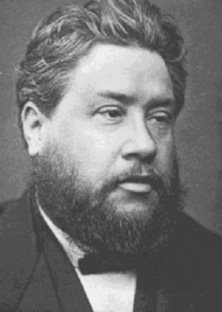Quotes on Man's Spiritual Impotence
Apart from Divine Grace
by C. H. Spurgeon
Unrenewed Man hates the gospel with all his heart!
Spurgeon, "Fire: the Want of the Times"
Brethren, there is nothing in the
gospel, apart from the Spirit of God,
which can save a man, for man
hates the gospel with all his heart!
Though the reasonableness of the gospel
of Jesus ought to make the belief of it
universal, yet its plain dealing with human
sin excites deadly antagonism. Therefore,
the gospel itself would make no progress
were it not for the divine power.
There is an invisible arm which pushes forward
the conquests of the truth. There is a fire unfed
with human fuel, which burns a way for the truth
of Jesus Christ into the hearts of men.
--------------------------------------------------------
The New Heart
God does not promise that He will improve our nature,
or that He will mend our broken hearts. No- the promise
is that He will give us 'new' hearts and right spirits.
Human nature is too far gone ever to be mended--
It is not a house which is a little out of repair, with
here and there a slate blown from the roof, and here and
there a piece of plaster broken down from the ceiling.
No; it is rotten through-out; the very foundations have been
sapped; there is not a single timber in it which is sound; it is
all rottenness from its uppermost roof to its lowest foundation,
and ready to fall. God does not attempt to mend it. He does not
shore up the walls, and repaint the door; He does not garnish
and beautify, but He determines that the old house shall be
entirely swept away, and that He will build a new one.
It is too far gone to be mended. If it were only a little out
of repair, it might be restored. If only a wheel or two of that
great thing called "Manhood" were out of repair, then He who
made man, might put the whole to rights; He might put a new cog
where it had been broken off, and another wheel where it had
gone to ruin, and the machine might work anew.
But no; the whole of it is out of repair; there is not one lever
which is not broken; not one axle which is not disturbed.
"The whole head is sick, and the whole heart faint. From the
sole of the foot unto the head, there is no soundness in it;
but wounds, and bruises, and putrefying sores."
The Lord, therefore, does not attempt the repairing of
this thing, but He says, "A new heart also will I give you,
and a new spirit will I put within you."
--------------------------------------------------------
The Great Heart Changer!
From Spurgeon's, "The Stony Heart Removed"
The heart of the natural man, like marble,
is stone-cold towards spiritual things.
No arguments have power to move a soul so steeled,
so thoroughly stony, hard, and impenetrable.
O rocks of iron and hills of brass,
you are softer than the proud heart of man!
Fallen man is like the deaf adder which will not be charmed,
charm we never so wisely.
Tears are lost on him.
Threatenings are but as the whistlings of the wind.
The preachings of the law, and even of Christ crucified--
all these are null and void and fall hopelessly to the ground,
so long as the man's heart continues what it is by nature--
dead, and hard, and cold.
The heart of man grows harder whether it be the soft sunshine
of love, or the harsh tempest of judgment that falls upon it.
Mercy and love alike make it more solid,
and knit its particles closer together;
and surely until the Omnipotent himself speak the word,
the heart of man grows harder, and harder, and harder,
and refuses to be softened or broken.
Granite may be ground and be broken into pieces,
but unless God gets the hammer in his hand,
and even he must put both hands to it,
the great 'granite heart' of man will not yield in any way.
You may smite a man's heart right and left with death,
with judgment, with mercy, with tears, with entreaties,
with threatenings, and it will not break!
No, even the fires of hell do not melt man's heart,
for the damned in hell grow more hard by their agonies,
and they hate God, and blaspheme him all the more
because of the suffering they endure.
Only Omnipotence itself, I say,
can ever soften this hard heart of man.
Christ is the Great Heart Changer!
"Lord, melt my heart.
None but a bath of blood divine can take the flint away;
but do it Lord, and you shall have the praise."




